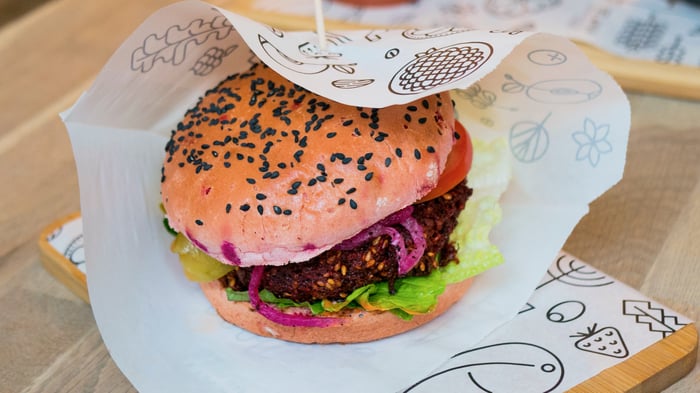
Love sinking your teeth into a big, juicy burger, but thinking about going vegan?
Here are a few things you should know:
- Sticking to your decision can be one of the biggest challenges you could face.
- There’s a chance that you'll fall off the diet change wagon.
But it’s less of a struggle when you know the most common reasons people don’t stay on track. So, these are the steps to help you stick to your decision.

Common Reasons For Not Sticking To Veganism
The three most common reasons for not sticking to veganism are:
- Making the switch for the wrong reasons
- Having unreasonable expectations
- Being the only vegan in your social circle
Choosing a plant-based diet has implications on your health, time, resources, and relationships, and many people don’t realize this upfront.
If you want to go vegan because your favorite celebrity did or because it’s trendy, you need to re-examine your motivation. Celebrities and trends come and go, so if you want your decision to give up meat to be a lasting one, it needs to be founded on firm principles. Likewise, if it was based on the hope of losing weight or improving your performance in sports or at the gym, you might want to put a little more thought into it.
Some people revert to meat-inclusive diets because their family isn’t vegan. Whether you or someone else is doing the cooking, it can be challenging to be the odd one out. Sometimes it’s easier to cave and eat that burger. Some even choose the easier way and include dairy, fish, or eggs in their diet when eating at non-vegan events. This reason often goes hand-in-hand with the issue of convenience. It's easy to slide back into old habits.
So, if your mouth starts watering for a great, big sausage, or you’re tempted to take the most comfortable option, stop, breathe, and think. There are more significant issues and bigger benefits at stake here – benefits for the wellbeing of yourself, the animals, and the environment.
 Check out compostible BioCups
Check out compostible BioCups
Why Veganism Is Good For You And The Environment
According to Walter Willett, professor of epidemiology and nutrition at Harvard T.H. Chan School of Public Health, a plant-based diet increases longevity. In an interview, Willett said that a plant-based diet can reduce the risk of heart disease and type 2 diabetes. He added that veganism also could benefit the planet, as farming cattle for the meat industry generates enormous amounts of greenhouse gases such as methane and carbon dioxide.
The idea is to be vegan, but if it takes you some time to reach that goal, you can still enjoy the benefits of a mostly plant-based diet.
 Pic: @goodvibesonly
Pic: @goodvibesonly
How To Transition Slowly And Without Judgement
There are different ways to adopt a vegan diet and lifestyle. One way is to make a drastic change by removing all meat and animal-derived products in one go, but that’s difficult to do. Another way is to transition slowly, which makes the transition more manageable.
If you recently decided to become vegan, make sure you speak to a doctor before changing your diet. Once you have the all-clear from your health practitioner, start by moving from being an omnivore to a vegetarian. This allows you to include some animal products, such as dairy and eggs, in your diet. When cutting meat, fish, and poultry out, start with the foods you don’t like.
You don’t need to increase the amount of eggs and dairy that you eat to make up for the protein you lose. Instead, focus on increasing your intake of plant proteins.
A few quick and easy meat substitutes you can add to or increase in your diet include tofu, tempeh, beans, lentils, garbanzo beans/chickpeas, and jackfruit. If you’re looking for inspiration, read this handy substitute guide. It’s important to acknowledge that none of the plant proteins that are likely to form a large part of your new diet can replicate the taste or texture of meat. Instead of being disappointed by unmet expectations (if that’s what you had), use this time to learn to appreciate these ingredients.
Next, transition from being vegetarian to being vegan. Do this by slowly phasing eggs, dairy, and animal-derived products from your diet. There are some great dairy alternatives that you can enjoy.
It’s essential to go through this process without judging yourself and taking onboard any judgment that may come from others. Be patient. Give yourself permission to slip up a few times along the way.

Forget About Being A Strict Vegan
You’re more likely to stick to veganism if you forget about being a strict vegan. Remember, veganism is a way of life that aims to exclude cruelty to and exploitation of animals, whether it’s for food, clothing, entertainment, the medical industry, the beauty industry, or anything else.
It’s essential to live up to this principle to the best of your ability, but it’s also important to accept that living a totally vegan lifestyle is almost impossible. A number of the plant products you purchase might be grown by farmers who use pesticides or other means to kill insects or animals that eat their crops. Some crops may be grown in ways that lead to the mass destruction of the habitats of wild animals. Other products may leave a huge carbon footprint behind when getting from their source to your home. Do what you can. Go easy on yourself and take it from there.







